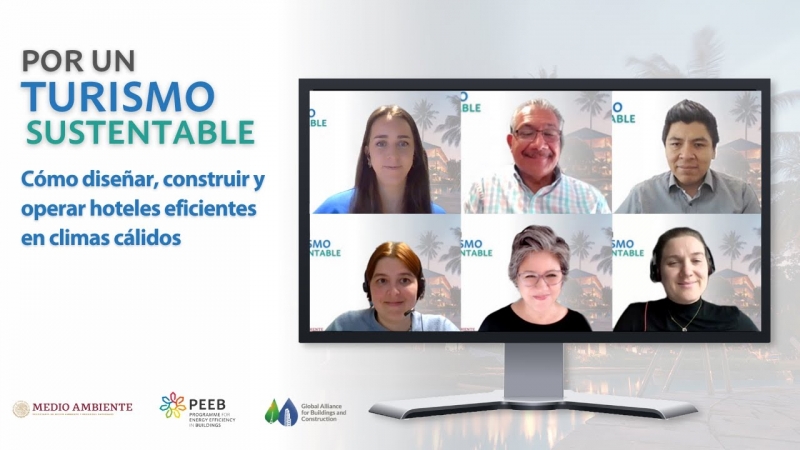Global tourism is responsible for around 8% of the world’s carbon emissions. From the travel to get there, to the transportation in the area, from the accommodation to the food we eat or the services and souvenirs we buy, tourism generates high levels of emissions.
Therefore the tourism sector has an important role to play in the fight against climate change. Within the tourism industry, hotels are the type of buildings that emit the most emissions in their construction and operation. As such, hotels must reduce their carbon footprint to guarantee sustainable development in Latin America and the Caribbean.
Energy-efficient buildings play a crucial role in saving energy, money and creating comfortable spaces. In addition, they have a positive environmental impact by emitting less greenhouse gases. Promoting sustainable buildings is essential to achieve the Paris Agreement and the Sustainable Development Goals.
The Program for Energy Efficiency in Buildings (PEEB) in collaboration with SEMARNAT and the Global Alliance for Buildings and Construction (Global ABC), organized a webinar on March 30, 2023, with various industry experts to present the Guide on energy efficiency in the design, construction and operation of hotels in hot climates, with the aim of sharing experiences with professionals in the sector, helping them to plan and implement energy efficiency measures in hotels throughout Latin America and the Caribbean.
The webinar dived on practical tips and specific solutions for energy efficiency in hotels, including lighting, air conditioning, hot water, refrigeration, and renewable energy production.
This guide has served to increase the profitability of the business units through the efficient and rational use of energy, said Arturo Lozano, representative of the Mexican hotel group Posadas. "The actions we have implemented in the hotels have helped us reduce energy use by 34%, which has meant saving 184 million pesos (1 M EUR) and we have reduced greenhouse gas emissions by 29%," he explained.
The production of the guide and a series of public-private collaboration initiatives have been central to PEEB’s work in Mexico, in line with the programme’s mission to help countries increase efficiency across their building sector.
“PEEB is transforming the sector through financing, policy framework and capacity building, with the vision of achieving a zero emission and resilient buildings sector”, explained Isabel Geppert, head of PEEB who also joined the webinar together with Arturo Lozano, Liliana Campos, from PEEB/GIZ Mexico, Daniel López, from SEMARNAT, Nora Steurer from the GlobalABC and María Lau, from PEEB/GIZ Mexico.
Hotel sector
The guide on energy efficiency in hotels is a practical tool to implement energy efficiency in the hotel sector. It shows the sector's market size, energy consumption, energy reduction potential, and greenhouse gas mitigation projections. Additionally, it shows some of the benefits that can be obtained by implementing the strategies from the guide.
Technologies
The guide shows different technologies and strategies that can be implemented in the sector. It provides advice to support lodging establishments to take measures to reduce their energy consumption and how to implement them.
Financing models
The guide shows implementation models for energy efficiency, including financing models, business models, and examples of energy-efficient hotels. It also shows the different certifications available in the Mexican market, which serve as a tool to demonstrate the commitment of lodging establishments.
Read this article in Spanish here and check the guide here. You can watch the webinar here and below (in Spanish).
By viewing the video, you agree that your data will be transmitted to YouTube and that you have read the privacy policy.


 more
more